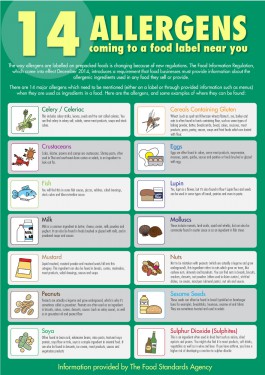














What are the 14 allergens that are regulated in the UK?
Food allergies are a significant concern worldwide, affecting millions of individuals who must carefully monitor their diet to avoid potentially life-threatening reactions. In the United Kingdom, strict regulations have been put in place to ensure that consumers are well-informed about the presence of allergens in their food. The Food Information Regulations (2014) and the Food Labelling Regulations (2014) outline the requirements for food businesses to declare the presence of 14 specific allergens. This article explores these allergens, the regulations governing them, and the importance of clear and accurate food labeling.
The 14 Allergens
- Cereals containing gluten: This includes wheat, rye, barley, and oats, as well as their hybridized strains.
- Crustaceans: Shellfish such as crab, lobster, shrimp, and prawns fall under this category.
- Molluscs: Includes shellfish like mussels, clams, oysters, and squid.
- Fish: Covers all types of fish, whether it's fresh, frozen, or processed.
- Peanuts: Peanuts are a common allergen and are present in various forms in many processed foods.
- Tree nuts: This category includes almonds, hazelnuts, walnuts, cashews, pecans, Brazil nuts, pistachios, and macadamia nuts.
- Soybeans: Soy is a versatile ingredient found in many processed foods and is a common allergen.
- Milk: All forms of milk, including cow's, goat's, and sheep's milk, as well as products derived from milk, like cheese and butter.
- Eggs: This includes eggs from all birds, and it's crucial to note the presence of eggs in both raw and processed forms.
- Mustard: Mustard is found in various condiments and sauces and must be declared on the label.
- Sesame seeds: Sesame is used in a variety of culinary applications, and its presence must be clearly stated.
- Celery: Both the stalks and leaves of celery are included in this category.
- Sulphur dioxide and sulphites: Often used as preservatives, sulphur dioxide and sulphites are found in dried fruits, wine, and some processed foods.
- Lupin: Lupin is a legume that is increasingly being used in food products and must be declared on the label.
Regulations and Labeling Requirements
Food businesses in the UK are required to provide clear and accurate information about the presence of these allergens in their products. This information must be easily accessible to consumers and presented in a way that is easy to understand. The regulations apply to all types of food, including pre-packaged goods, non-pre-packaged foods, and food sold in restaurants and cafes.
Businesses must list allergens in the ingredients list or provide a separate allergen information statement. Ingredients that are derived from the 14 allergens must be emphasized in some way, such as by using bold text, italics, or a different font. Additionally, information about allergens must be available for non-pre-packaged foods, such as those sold in restaurants, either in written form or verbally upon request.
The Importance of Clear Allergen Labeling
Accurate allergen labeling is crucial for the safety and well-being of individuals with food allergies. An allergic reaction can range from mild discomfort to severe and life-threatening symptoms. Clear and reliable information enables consumers to make informed choices about what they eat, reducing the risk of accidental exposure to allergens.
For businesses, compliance with allergen regulations is not just a legal requirement but also a demonstration of social responsibility. It builds trust with consumers and ensures that products are accessible to a broader range of individuals, including those with food allergies.
The regulation of 14 allergens in the UK is a vital step toward safeguarding public health and empowering consumers to make informed decisions about the food they consume. By understanding and adhering to these regulations, food businesses play a crucial role in creating a safer and more inclusive food environment for everyone. As awareness of food allergies continues to grow, it is essential for both consumers and businesses to prioritize clear and accurate allergen labeling.
Written on 2023-11-05 by Juliet Moran
More Articles:
9 Allergens regulated in the USA for RestaurantsCourt find restaurant owner guilty
What do you write on a menu for allergies?
Allergy expert urges food service teams to prioritise allergy training
Allergy Expert Slams Airlines after Love Islander Almost Dies
The Digital Menu Revolution
QR code for menus with allergy filter
Handy guide to managing allergies in a Restaurants
FSA Board agrees to strengthen allergy information for consumers
What are the 14 allergens that are regulated in the UK?
Allergen Best Practices in Restaurants
Digital Menu App for Restaurants
Mandatory allergens on menu - Owens Law
Calorie labelling restaurant menu's
Natasha's Law - Allergy Information
Why use Allergy Menu?
£15 a
Month
Live
Menu
Brand
Logo
Menu
Import
Map
Finder
QR
Code
Meet regulations for allergy information in one simple step.
Ensure your menu allergens are always accurate and up to date.
Improve your customer experience for allergy sufferers, vegans & veggies.
No need to re-print menus if you change ingredients or substitute.
Handy monthly email reminders to check your menu.
Stop front-of-house staff making mistakes.



